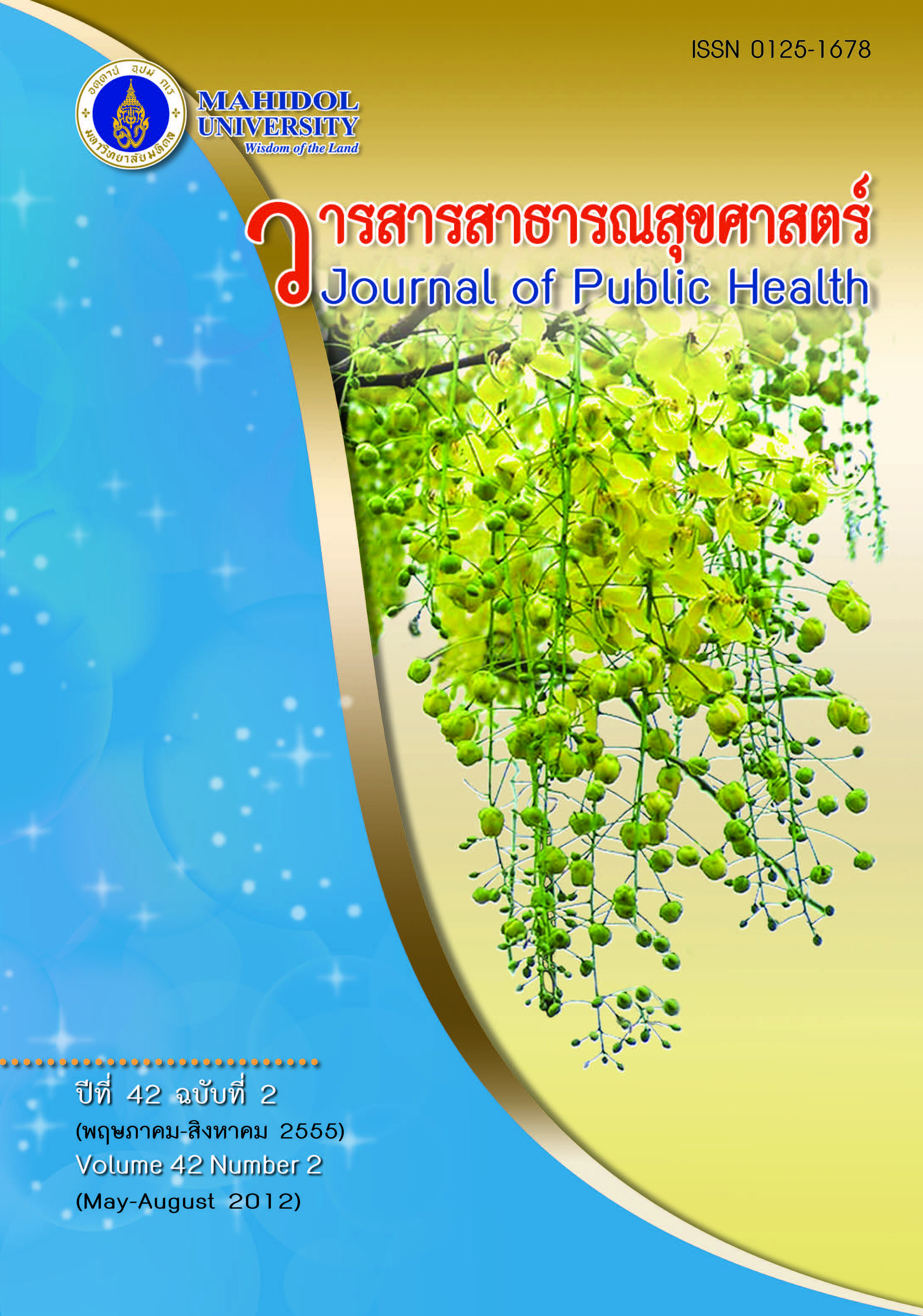การประยุกต์ทฤษฎีการรับรู้ความสามารถตนเองในการออกกำลังกายด้วยโยคะของนักศึกษาหญิง มหาวิทยาลัยเทคโนโลยีราชมงคลธัญบุรี จังหวัดปทุมธานี
Keywords:
การออกกำลังกายด้วยโยคะ, นักศึกษาหญิง, การรับรู้ความสามารถตนเอง, yoga exercise, female students, self-efficacyAbstract
บทคัดย่อ
การวิจัยกึ่งทดลองนี้ มีวัตถุประสงค์เพื่อศึกษา ประสิทธิผลของโปรแกรมการออกกำลังกายด้วยโยคะ โดยประยุกต์ใช้ทฤษฎีการรับรู้ความสามารถตนเอง กลุ่มทดลองและกลุ่มเปรียบเทียบเป็นนักศึกษาหญิง ชั้นปีที่ 2 และ 3 ของวิทยาลัยการแพทย์แผนไทย มหาวิทยาลัยเทคโนโลยีราชมงคลธัญบุรี จังหวัด ปทุมธานีกลุ่มละ 35 คน โปรแกรมประกอบด้วย การให้ความรู้ การสร้างการรับรู้ความสามารถตนเอง และความคาดหวังในผลลัพธ์ ใช้วิธีการบรรยาย ดูวีดิทัศน์ สาธิต ฝึกปฏิบัติ อภิปรายกลุ่ม ใช้ตัวแบบ การเล่าประสบการณ์ที่ประสบความสำเร็จ ใช้คำพูด ชักจูง กระตุ้นทางอารมณ์ และฝึกตามคู่มือที่บ้าน นาน 4 สัปดาห์ๆ ละ 3 วันๆ ละ 90 นาที รวม 12 ครั้ง เก็บรวบรวมข้อมูลโดยใช้ แบบสอบถาม และ ทดสอบสมรรถภาพทางกายและจิตใจ วิเคราะห์ข้อมูล ด้วยสถิติ Paired Sample t-test และ Student’s t-test ผลการศึกษา พบว่า หลังการทดลอง กลุ่มทดลอง มีความรู้ การรับรู้ความสามารถตนเอง ความคาดหวัง ในผลลัพธ์ และมีพฤติกรรมการออกกำลังกายด้วย โยคะ ดีขึ้นกว่าก่อนการทดลอง และกลุ่มเปรียบเทียบ อย่างมีนัยสำคัญทางสถิติ(p<0.001) และสมรรถภาพ ทางกาย ของกล้ามเนื้อไหล่ และหลังส่วนล่างอ่อนตัว เพิ่มขึ้น อย่างมีนัยสำคัญทางสถิติ (p<0.001 และ p<0.007 ตามลำดับ) ด้านความเครียด ลดลงอย่าง มีนัยสำคัญทางสถิติ (p<0.001 และ p<0.045 ตามลำดับ) ผลการศึกษาชี้ให้เห็นว่าการจัดโปรแกรม การออกกำลังกายด้วยโยคะโดยประยุกต์ใช้ทฤษฎี การรับรู้ความสามารถตนเอง ควรนำไปประยุกต์ใช้ กับนักศึกษาสถาบันต่างๆ เพื่อการมีสุขภาพดีทั้งกาย และจิตใจ
คำสำคัญ: การออกกำลังกายด้วยโยคะ; นักศึกษาหญิง; การรับรู้ความสามารถตนเอง
ABSTRACT
This quasi-experimental research aimed to study the effectiveness of a yoga exercise program by applying self-efficacy theory among female undergraduates. The experimental group was sophomores and the comparison group was third year female students of Faculty of Thai Traditional Medicine, Rajamangala University of Technology, Pathumthani Province. Each group comprised 35 students. The program included; improving yoga knowledge, self-efficacy and outcome expectancy by lecture, VCD study, demonstration, group discussion, vicarious experiences from modeling, mastery experience, verbal persuasion, emotional motivation and practice with manual at home. The program was conducted for four weeks, three days/week, 90 minutes/day, totaling 12 sessions. The data were collected by using questionnaires and measuring physical and mental fitness. Paired Sample t-test and Student’s test were used for data analysis. The research showed that after the intervention, the experimental group had a significantly higher level of knowledge, perceived self-efficacy, outcomes expectation for practicing yoga exercise, and yoga exercise behaviors than before the intervention and the comparison group (p<0.01), physical fitness, significantly higher flexibility of shoulder and lower back muscles were found (p<0.001 and p<0.007, respectively) and stress was significantly lower than before (p<0.001 and p<0.045, respectively). These research results suggests that a yoga exercise program applying selfefficacy theory should be used for promoting yoga exercise behavior for undergraduates in order to promote physical and mental health.
Key words: yoga exercise; female students; self-efficacy
Downloads
Issue
Section
License
Creative Commons License CC-BY-ND


